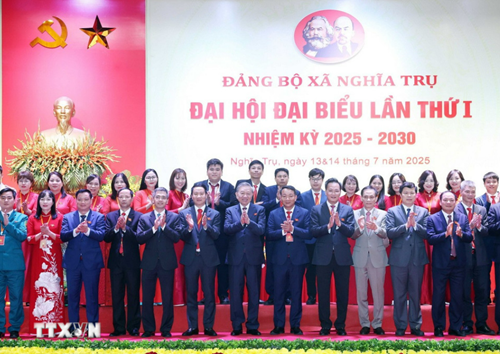Attending the first congress of the communal Party organization on July 13-14, the Party leader urged the locality to turn itself as a model for urban development integrated with ecological agriculture, new rural services, and the preservation of traditional values. Due attention should be given to multi-axis economic development, capitalizing on its advantages as a suburban area to pursue rapid, sustainable, and targeted economic growth.
    |
 |
|
Party General Secretary To Lam attends the first congress of Nghia Tru commune's Party organization on July 14. |
He highlighted several directions for the local Party Committee to focus on, including urbanization linked to high-quality service development, establishment of commercial support service areas, and infrastructure upgrades, steering the commune towards achieving ward status in the coming time.
Agricultural development, he said, should zero in on high-quality production, building on the commune's traditional strengths in fruit cultivation, ornamental plants, and seedlings. He stressed that regional cultivation planning must follow the standards of smart agriculture, ecological agriculture, and experiential farming models aligned with VietGAP and traceability requirements.
The Party chief called for labor restructuring, coupled with vocational trainings to improve digital and business skills among local farmers, youth, and women, highlighting each village should establish cultural heritage preservation regulations, build cultural community spaces that balance modernity and local identity, and enhance communications work to raise public awareness of local tradition.
In the two-tier local government model, communes serve as the direct administrative level closest to the people, he said, laying stress on the need to shift towards proactive governance, build a workforce capable of digital application and having deep understanding of the people. Besides, administrative reform and digital transformation must be accelerated to handle related procedures.
For the upcoming term, the Party leader underscored the significance of building a strong and comprehensive Party organization, focusing on disciplined and rigorous leadership methods, strengthening the quality of party cell activities, and improving party members’ quality, ideology, ethics, and action capabilities.
The development of new Party members must be enhanced, particularly among young rural entrepreneurs and workers. The 12th Party Central Committee’s Resolution No.4 on Party building and rectification must be strictly implemented, according to Party General Secretary Lam.
He stated that it is necessary to select capable and trustworthy cadres who lead by action, avoid formality, and promote democracy while upholding discipline. The new Party Committee should translate the congress’s resolutions into detailed 5-year and 3-year programs and plans with clear targets and delegation of responsibilities. Administrative structures should be streamlined and oriented towards effective service delivery. Additionally, the commune’s planning must align with the province’s frameworks to ensure harmonious and sustainable development.
Emphasizing solidarity and close ties with the people are vital factors in the Party organization’s activities throughout the term, he expressed his confidence that with specific and practical objectives built on its practical experience, the Nghia Tru Party organization will transform the commune into a leading model in the urbanization process, digital transformation, and sustainable development of Hung Yen province and the region as a whole.
On the occasion, the Party chief visited the public administrative service center of Nghia Tru commune.
The Nghia Tru Party organization was established by merging the Party organizations of Long Hung, Nghia Tru, and Vinh Khuc communes. During the 2020-2025 term, the newly-merged commune achieved an average annual economic growth rate of 14.8%, with per capita income reaching 152 million VND (over 5,800 USD) by 2025. Poverty was eradicated, and education quality remained high, with all schools maintaining national standards.
Source: VNA